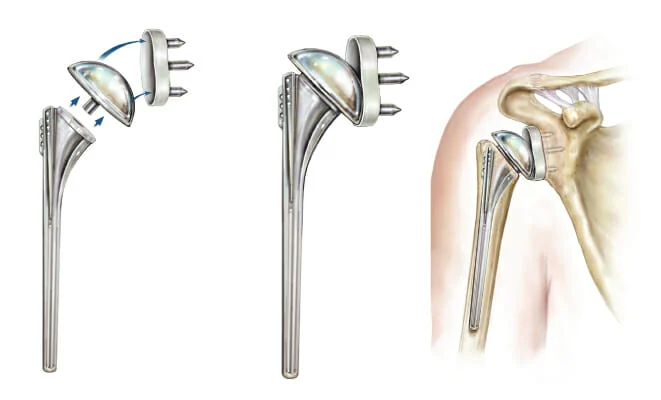Shoulder Replacement Surgery in India

Planning your medical trip is a very simple process for Total Shoulder Replacement Surgery in India. Whether you are seeking relief from arthritis pain or severe joint damage, total shoulder replacement surgery can be an effective solution. In this comprehensive guide, we will explore the various aspects of shoulder replacement surgery in India, including its definition, symptoms, treatment options, and the benefits of choosing India as your medical tourism destination.
Understanding Total Shoulder Replacement Surgery
Shoulder replacement surgery is a surgical procedure that involves replacing part or all of the glenohumeral joint with a prosthetic implant. This procedure is primarily performed to relieve arthritis pain or fix severe physical joint damage. The shoulder joint is a ball-and-socket joint consisting of the upper arm bone (humerus), shoulder blade (scapula), and collarbone (clavicle). The surfaces of these bones are covered with articular cartilage, which enables smooth movement of the joint.
Patients with severe arthritis of the shoulder joint often experience a range of symptoms. Common symptoms include:
1. Persistent deep ache within the shoulder joint
2. Pain worsens with movement and activity, and may persist even at rest
3. Grinding or grating noises when moving the shoulder
4. Restricted range of motion and weakness in the affected shoulder
5. Swelling, tenderness, and stiffness of the joint
While medications and lifestyle adjustments may temporarily alleviate pain and improve joint function, there may come a time when surgical treatment is necessary. Surgical intervention is recommended when conservative management fails to provide adequate relief. If you are experiencing persistent shoulder pain, difficulty in performing daily activities, and a decline in overall quality of life, shoulder replacement surgery may be a viable option.
The Success of Shoulder Replacement Surgery
Shoulder replacement surgery has a proven track record of success in relieving joint pain and improving overall function. Although shoulder joint replacement is less common than knee or hip replacement, it is equally effective. According to the Agency for Healthcare Research and Quality, approximately 53,000 people in the U.S. undergo shoulder replacement surgery each year.
The history of shoulder replacement surgery dates back to the late 19th century when the French surgeon Jean Pean performed the first recorded shoulder arthroplasty. Since then, advancements in surgical techniques and prosthetic designs have significantly improved the outcomes of shoulder replacement surgery. Charles Neer, a prominent figure in the field, played a pivotal role in the development of modern total shoulder arthroplasty (TSA) in the 1950s.
The complexity of the shoulder joint anatomy contributes to the relatively lower number of shoulder replacement surgeries compared to knee and hip replacements. The shoulder complex, including the clavicle, scapula, and humerus, sacrifices stability for mobility, making it susceptible to injury, dysfunction, and instability. This complexity necessitates multiple variations in prostheses and surgical procedures based on the specific tissues involved.
Shoulder Replacement Surgery in India
India has emerged as a leading destination for medical tourism, offering high-quality healthcare services at affordable prices. The country boasts state-of-the-art hospitals, experienced surgeons, and a favorable healthcare ecosystem. Here, we explore the reasons why India is an excellent choice for shoulder replacement surgery.
India is home to internationally accredited hospitals equipped with cutting-edge technology and world-class infrastructure. These hospitals adhere to stringent quality standards and maintain a patient-centric approach. The medical staff, including surgeons, nurses, and support staff, are highly skilled and experienced in performing complex procedures like shoulder replacement surgery.
One of the major advantages of undergoing shoulder replacement surgery in India is the cost-effectiveness of the treatment. The overall cost of the procedure, including surgery, hospital stay, and post-operative care, is significantly lower compared to Western countries. Patients can save up to 60-80% on their medical expenses without compromising on the quality of care.
India is renowned for its pool of highly experienced and skilled surgeons specializing in various fields of medicine, including orthopedics. These surgeons have extensive training and expertise in performing shoulder replacement surgeries, ensuring optimal outcomes for patients. Many surgeons in India have received international recognition and are associated with prestigious medical institutions.
When traveling to India for shoulder replacement surgery, medical tourists can avail themselves of comprehensive medical tourism services. Joint Replacement Surgery Hospital India, a leading medical tourism facilitator, offers assistance with travel arrangements, accommodation, hospital appointments, and post-operative care. This ensures a hassle-free experience and allows patients to focus on their recovery.
The Procedure and Treatment Options
Shoulder replacement surgery involves the removal of damaged parts of the shoulder joint and their replacement with artificial components known as prostheses. The treatment options can vary depending on the extent of joint damage and the specific condition being treated.
In cases where only a portion of the shoulder joint is affected, a partial shoulder replacement may be performed. This involves replacing the head of the humerus bone with a prosthetic component while preserving the socket (glenoid). Partial shoulder replacement is often recommended for conditions such as osteonecrosis of the humeral head and neck.
Total shoulder replacement is a more extensive procedure that involves replacing both the ball (head of the humerus) and the socket (glenoid) with prosthetic components. This procedure is commonly performed to treat severe arthritis, post-traumatic arthritis, and inflammatory arthritis. It provides significant pain relief and improves joint function.
Reverse total shoulder replacement (rTSA) is a specialized procedure used to treat complex shoulder conditions, including rotator cuff deficiency and previously failed shoulder arthroplasty. Unlike traditional shoulder replacement, rTSA involves reversing the positions of the ball and socket components. This innovative approach enhances stability and improves range of motion.
Preparing for Shoulder Replacement Surgery
Before undergoing shoulder replacement surgery, thorough preparation and understanding of the procedure are essential. This section provides valuable insights into the pre-operative phase, including diagnostic tests, consultations, and lifestyle adjustments.
To determine the suitability for shoulder replacement surgery, patients undergo a series of diagnostic tests and consultations. These may include physical examinations, imaging studies (X-rays, MRI), blood tests, and consultations with orthopedic specialists. These assessments help the medical team understand the underlying condition, plan the surgery, and address any specific concerns or risks.
In preparation for shoulder replacement surgery, patients may be advised to make certain lifestyle adjustments. This can include maintaining a healthy diet, engaging in physical therapy exercises, and quitting smoking. Additionally, patients may need to discontinue certain medications that can interfere with the surgery or recovery process. Adhering to these pre-operative care guidelines helps optimize the surgical outcome.
As the surgery date approaches, patients should prepare for their hospital stay. This involves packing necessary items such as comfortable clothing, toiletries, and any prescribed medications. It is also important to arrange for transportation to and from the hospital and to inform family members or caregivers about the surgery schedule.
Shoulder Replacement Surgery: The Procedure
Shoulder replacement surgery is performed in a hospital setting under the supervision of a skilled surgical team. This section provides an overview of the surgical procedure, including anesthesia, incision techniques, and the implantation of prosthetic components.
Prior to the surgery, the patient is administered anesthesia to ensure a painless and comfortable experience. Depending on the patient’s condition and the surgeon’s preference, either general anesthesia or regional anesthesia may be used. The surgical team closely monitors the patient’s vital signs throughout the procedure.
The surgeon makes an incision in the shoulder area to access the joint. The size and placement of the incision may vary depending on the specific surgical technique and the patient’s anatomy. Minimally invasive techniques may be employed to minimize scarring and promote faster recovery.
The surgeon carefully removes the damaged parts of the shoulder joint, including the arthritic or damaged bone and cartilage. The prosthetic components, customized to fit the patient’s anatomy, are then implanted. These components may be made of metal, plastic, or a combination of both, and are designed to mimic the natural structure and function of the shoulder joint.
Once the prosthetic components are securely in place, the surgeon closes the incision using sutures or staples. The shoulder is then immobilized using a sling or other supportive devices. Following the surgery, patients are closely monitored in the recovery area before being transferred to their hospital room. Post-operative care, including pain management, physical therapy, and wound care, plays a crucial role in the rehabilitation process.

Recovery and Rehabilitation
Recovery and rehabilitation are integral parts of the shoulder replacement surgery journey. This section provides insights into the post-operative phase, including the duration of hospital stay, pain management, physical therapy, and the expected timeline for returning to daily activities.
The duration of the hospital stay after shoulder replacement surgery varies depending on individual factors and the surgeon’s recommendation. During this time, patients receive comprehensive care from the medical staff, including pain management, wound care, and physical therapy. Regular follow-up appointments are scheduled to monitor the healing process and address any concerns or complications.
Pain management is a critical aspect of the recovery process. The medical team employs various strategies to control pain, including the administration of pain medications and non-pharmacological interventions such as ice packs and elevation. Patients are provided with detailed instructions on pain medication usage and are encouraged to communicate any discomfort or side effects to the healthcare providers.
Physical therapy plays a vital role in restoring joint function, improving range of motion, and strengthening the shoulder muscles. Patients are guided through a customized rehabilitation program that includes exercises and stretches targeting specific muscle groups. The physical therapist closely monitors the progress and adjusts the therapy plan accordingly.
The timeline for returning to daily activities varies from patient to patient. In general, patients can expect to regain functional use of their shoulder within a few weeks to a few months after surgery. The surgeon and physical therapist provide guidance on gradually resuming activities such as dressing, bathing, driving, and participating in recreational pursuits. It is important to follow the recommended guidelines and avoid overexertion during the recovery period.
Risks and Complications
Although shoulder replacement surgery is considered a safe procedure, there are potential risks and complications. This section highlights the importance of understanding these risks and provides insight into the measures taken by the surgical team to minimize them.
Common risks and complications associated with shoulder replacement surgery include infection, blood clots, implant dislocation, stiffness, nerve damage, and allergic reactions to anesthesia or materials used in the prosthetic components. The surgical team takes necessary precautions, such as ensuring a sterile environment, administering prophylactic antibiotics, and closely monitoring the patient during and after surgery, to reduce the risk of complications.
Following the surgeon’s instructions and adhering to the post-operative care guidelines significantly reduce the risk of complications. Patients are advised to keep the surgical site clean and dry, take prescribed medications as directed, attend all follow-up appointments, and report any unusual symptoms or concerns promptly. With proper precautions and diligent care, the risk of complications can be minimized.
Testimonials and Success Stories
Hearing from individuals who have undergone shoulder replacement surgery can provide reassurance and inspiration for those considering the procedure. This section showcases testimonials and success stories from patients who have experienced positive outcomes after their surgery in India.
Patient Testimonial – Andre Jacobs from South Africa
Andre Jacobs, a patient from South Africa, shares his success story after undergoing shoulder replacement surgery in India through Joint Replacement Surgery Hospital India. He highlights the excellent medical care, skilled surgeons, and seamless medical tourism services that contributed to his positive experience and improved quality of life.
Conclusion
Shoulder replacement surgery in India offers a safe and effective solution for individuals suffering from severe shoulder arthritis or joint damage. With state-of-the-art healthcare facilities, experienced surgeons, and cost-effective treatment options, India has emerged as a preferred destination for medical tourism. By choosing India as your medical tourism destination, you can benefit from high-quality care, favorable outcomes, and a positive rehabilitation experience. Take the first step towards a pain-free and functional shoulder by exploring the options available in India for shoulder replacement surgery.


